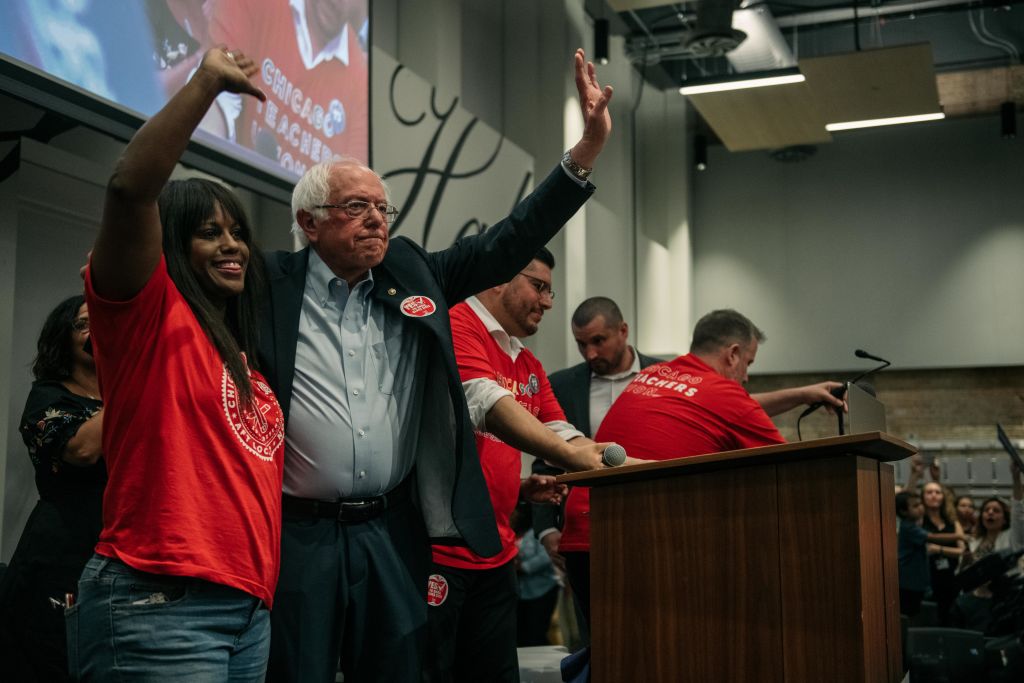Bernie Sanders Is Spoiling for a Fight With the DNC
With his new campaign finance reform plan, Sanders takes aim at Democratic Party kingmakers and their lobbyist friends. In a crowded field, this audacity sets him apart.

Democratic presidential candidate Sen. Bernie Sanders waves to the crowd at a rally in support of the Chicago Teachers Union ahead of an upcoming potential strike on September 24, 2019 in Chicago. Scott Heins / Getty
A few weeks ago, two Democratic Party officials toured K Street shops to explain how lobbyists can donate to the 2020 Democratic Party convention in Milwaukee. Politico obtained documents showing that, for example, $300,000 gets you VIP credentials and glitzy skyboxes towering above the convention floor.
In 2016, seventeen donors ponied up three-quarters of the Democratic National Convention’s funding, with many corporate sponsors (including Facebook, Bank of America, and Comcast) donating over $1 million apiece. More than a few of those donors also shelled out for the Republican National Convention, sending a clear message: whoever wins, we expect our interests to be represented going forward. Otherwise, you can kiss our money goodbye.
Today, Bernie Sanders threw down the gauntlet on corporate sponsorship of the convention. He released a multipoint plan to get corporate money out of politics. Its very first stipulation: “As the Democratic nominee, Bernie will ban corporate contributions to the Democratic Party Convention and all related committees.”
If Sanders is set to clinch the nomination heading into the convention, he will have increased — which is not to say total, given the forces arrayed against him — leverage over the party. His new statement indicates that he plans on using that influence to shape the nature of the convention itself, striving to create what his national policy director Josh Orton called “a people-powered convention,” instead of a spectacle literally watched over by the megarich and their lackeys.
The DNC, for its part, is adamant that it will not return the money it has raised from lobbyists and corporate PACs, nor break its promises of exclusive access and credentials in exchange for cash. If Sanders were the frontrunner, the result would be a tug-of-war between the nominee and the establishment apparatus over the role of corporate interests at the convention. With this proposal, Sanders shows that he’s spoiling for that fight.
If corporate money and influence in the Democratic Party makes your blood boil, then you had better hope for a strong Sanders showing in the primaries, because no other candidate is planning to mount this kind of challenge.
Elizabeth Warren is often mentioned in the same breath as Sanders due to her progressive platform (which echoes but tends to stop short of Sanders’s own) and her temporary abstention from the top-dollar donor circuit (another page taken from the Sanders playbook). However, Warren has also been hard at work assuring the Democratic Party establishment that she doesn’t plan to ruffle feathers. Given that she’s been cozying up to Hillary Clinton on the campaign trail, that she hired a top money bundler with a fat Rolodex as her campaign treasurer, and that she has announced her intention to drop her big-money ban in the general election, there’s no indication that Warren is planning on getting crossways with party kingmakers over the issue of corporate donations.
Warren’s justification for turning to corporate donors if she wins the primary is that she opposes “unilateral disarmament” against the Republican Party. This same phrase was used to justify Barack Obama’s 2008 pivot to corporate fundraising, too, and we all know how that worked out. Sanders has a different philosophy: he believes that the best way to beat Donald Trump in the short term and reactionary conservatism in the long term is to inspire millions of otherwise disengaged working-class people to participate in the political process. The best way to do that is to show people that politics doesn’t have to be rigged against them — and to fight against the rigging.
Beltway pundits and operatives may consider abandoning the usual fundraising strategies insane and self-defeating, but they’ve already been proven wrong. Bernie Sanders consistently raises the most money of anyone in the Democratic Party primary field, and he does so with far and away the most individual donors (Sanders has convinced over one million people to donate to his campaign; Warren’s number is about half of that).
For Sanders, putting an end to business as usual is not just a commitment he holds as he pursues victory; it’s the path to victory itself. His warning shot to the DNC shows he’s not planning to back down. And if he goes into the convention on good footing, we can expect fireworks.